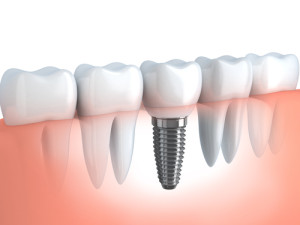There is much talk about implants on various parts of the body but what are dental implants? A dental implant is artificial tooth root canal placed into the jaw for holding replacement tooth. Dental implants are in reality metal posts or frames surgically positioned into a jawbone beneath the gums. When implants are in place, they allow dentists to mount
replacement teeth on to them. Dental implants could be an option if you have lost one of more teeth because of periodontal disease, injury or other reasons.
How do dental implants fit into the jaw?
Implants fuse into the jawbone providing stable support for the artificial teeth. Dentures and bridges mounted onto implants do not slip or shift in the mouth. The firmness is essential for chewing or speaking. This secure a fit also helps dentures, bridges, and crowns placed over the implants to feel more natural than those conventional dentures or bridges.
There are two main types of implants namely:
Endosteal Implants
These are dental implants a Hampton dentist surgically directly implants into a jawbone. This implant is generally used as the option for patie nts who have bridges or removable dentures. When the surrounding gum tissue heals, a second surgery will be performed for connecting a post to original implant. The final step is to attach artificial tooth or teeth to the post either individually or grouped onto the bridge or denture. Endosteal is the most common used dental implant. It is in several types including cylinders, blades or screws that are placed surgically into the jawbone. Each implant will hold a one prosthetic tooth or more.
nts who have bridges or removable dentures. When the surrounding gum tissue heals, a second surgery will be performed for connecting a post to original implant. The final step is to attach artificial tooth or teeth to the post either individually or grouped onto the bridge or denture. Endosteal is the most common used dental implant. It is in several types including cylinders, blades or screws that are placed surgically into the jawbone. Each implant will hold a one prosthetic tooth or more.
Subperiosteal Implants
These implants consist of metal frame fitted onto jawbone just underneath gum tissue. The frames fixes onto the jawbone as the gum heals. Posts that are attached to frame protrude through gums to hold prosthesis. Artificial teeth like with endosteal implants are mounted to posts. Subperiosteal implants are used on patients who cannot wear conventional dentures and have minimal bone height.
Right conditions for dental implants
Patients who should receive implants are those with healthy gums. The gum tissues should be free of periodontal disease.They should also have adequate bone for supporting Fort Worth dental implants. A patient must also commit to keep these structures in a healthy state. Maintaining good oral hygiene and regular visits to a dentist are critical for long term success of the dental implants.
Dental implants are closely connected with gum tissues and the underlying bone. When you need to be fitted with dental implants, it is advisable to consult a periodontist as this is a specialist dentist in this area. Periodontists have special training, knowledge and special facilities necessary to help patient get teeth that feel and look natural like their own. If you do not have a periodontist in mind ask you dentist to help you find one and they will work together to resolve your dental issues.